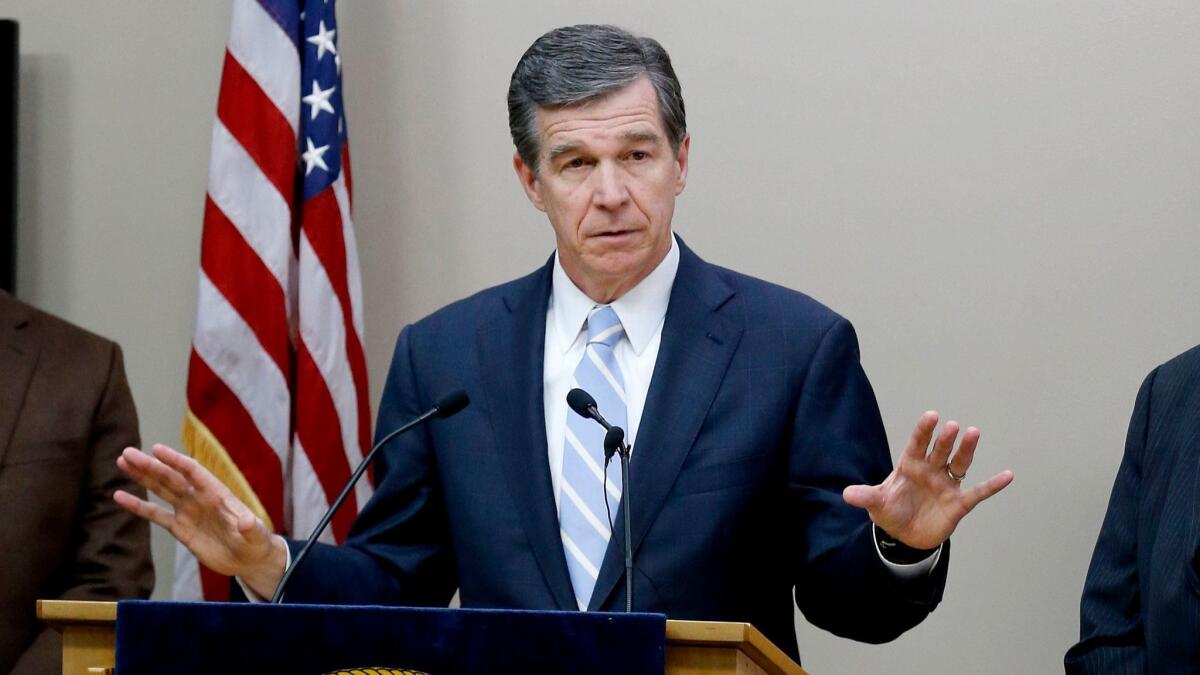North Carolina Gov. Roy Cooper and Legislature head to court in power showdown

- Share via
Reporting from RALEIGH, N.C. — North Carolina’s new Democratic governor and majority Republican Legislature are charging at each other in a constitutional game of chicken over their powers, a confrontation that could shape the recent conservative direction of state policies and spending.
The confrontation continues Tuesday, when the two branches of state government appear for a court hearing before the third.
A panel of three trial judges will gather in Raleigh to hear lawyers for Gov. Roy Cooper dispute attorneys for the state House and Senate leaders over whether new laws are constitutional.
“This is a fight that involves really the three branches of government. It’s one of a series of possible contests that we can see as the governor serves his term in office about who is going to make what decisions,” High Point University political scientist Martin Kifer said. “It also has to do with the pace of policymaking. This isn’t speeding things up.”
GOP lawmakers passed several provisions that reduced the incoming governor’s powers during a surprise special legislative session two weeks before Cooper took office Jan. 1. The laws:
- require Cooper’s Cabinet nominees to run 10 state agencies to be approved by the GOP-led Senate.
- strip Cooper’s control over administering elections and gives Republicans control over state and local elections boards during even-numbered years when elections for major statewide and national office are held.
- slash Cooper’s patronage hiring discretion and gives civil service protections to hundreds of political appointees hired by former Republican Gov. Pat McCrory, who narrowly lost to Cooper last fall.
Cooper might not like the increasing number of Republican limits, but he’d better get used to it, attorneys for legislative leaders said in a court filing.
The state’s constitution and legal precedents have created one of the country’s weakest governors, and makes the General Assembly the dominant branch, attorneys for state House Speaker Tim Moore and Senate leader Phil Berger wrote.
Cooper, who is called the plaintiff because he filed the lawsuit, “continues to argue that the Office of the Governor needs less legislative interference and more power to faithfully execute the laws,” legislative attorneys wrote. “Plaintiff is wrong.”
Cooper’s attorneys contend that if the laws are allowed to stand, the foundational idea of American democracy — that there should be a balance of powers between the competing legislative, executive and judicial branches — are out the window.
The determination of Republican lawmakers to diminish Cooper’s authority continued last week.
The state House passed along party lines two bills eliminating Cooper’s ability to choose board members at more than a dozen community colleges. General Assembly leaders would make those appointments instead. A proposed bill would strip Cooper of the ability to fill vacancies on the state District Court, where most criminal and civil cases get heard.
More to Read
Sign up for Essential California
The most important California stories and recommendations in your inbox every morning.
You may occasionally receive promotional content from the Los Angeles Times.










